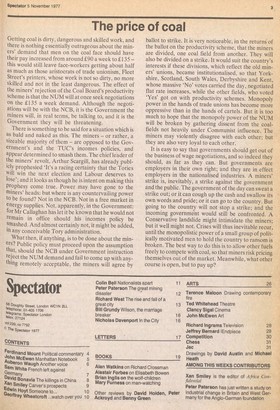The price of coal
Getting coal is dirty, dangerous and skilled work, and there is nothing essentially outrageous about the miners' demand that men on the coal face should have their pay increased from around £90 a week to £135 — this would still leave face-workers getting about half as much as those aristocrats of trade unionism, Fleet Street's printers, whose work is not so dirty, no more skilled and not in the least dangerous. The effect of the miners' rejection of the Coal Board's productivity scheme is that the NUM will at once seek negotiations on the £135 a week demand. Although the negoti ations will be with the NCB, it is the Government the miners will, in real terms, be talking to, and it is the Government they will be threatening.
There is something to be said for a situation which is as bald and naked as this. The miners — or rather, a sizeable majority of them — are opposed to the Gov ernment's and the TUC's incomes policies, and appear determined to smash them. The chief leader of the miners' revolt, Arthur Scargill, has already publ icly prophesied 'It's a racing certainty that the Tories Will win the next election and Labour deserves to lose'; and it looks as though he is intent on making this Prophesy come true. Power may have gone to the miners' heads: but where is any countervailing power to be found? Not in the NCB. Not in a free market in energy supplies. Not, apparently, in the Government: for Mr Callaghan has let it be known that he would not remain in office should his incomes policy be smashed. And almost certainly not, it might be added, in any conceivable Tory administration.
What then, if anything, is to be done about the miners? Public policy must proceed upon the assumption that, should the NCB under Government instruction reject the NUM demand and fail to come up with anything remotely acceptable, the miners will agree by ballot to strike. It is very noticeable, in the returns of the ballot on the productivity scheme, that the miners are divided, one coal field from another. They will also be divided on a strike, It would suit the country's interests if these divisions, which reflect the old miners' unions, became institutionalised, so that Yorkshire, Scotland, South Wales, Derbyshire and Kent, whose massive 'No' votes carried the day, negotiated flat rate increases, while the other fields, who voted 'Yes' got on with productivity schemes. Monopoly power in the hands of trade unions has become more oppressive than in the hands of cartels. But it is too much to hope that the monopoly power of the NUM will be broken by gathering dissent from the coalfields not heavily under Communist influence. The miners may violently disagree with each other; but they are also very loyal to each other,
It is easy to say that governments should get out of the business of wage negotiations, and so indeed they should, as far as they can. But governments are employers in their own right; and they are in effect employers in the nationalised industries. A miners' strike is, inevitably, a strike against the government and the public. The government of the day can sweat a strike out; or it can cough up the cash and swallow its own words and pride; or it can go to the country. But going to the country 7 will not stop a strike; and the incoming government would still be confronted. A Conservative landslide might intimidate the miners; but it well might not, Crises will thus inevitable recur, until the monopolistic power of a small group of politically motivated men to hold the country to ransom is broken. The best way to do this is to allow other fuels freely to compete with coal, so that miners risk pricing themselves out of the market. Meanwhile, what other course is open, but to pay up?


































 Previous page
Previous page